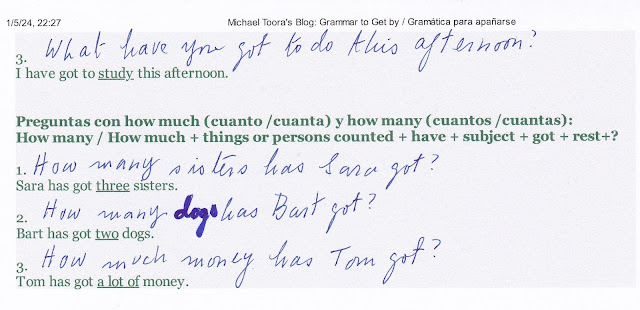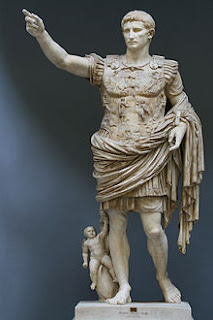Sancho
Today we're reviewing my list of plurals. It's not the longest list in the world, but it's got what's most frequent and important, at least in my opinion. When we're done reviewing, we'll do the Plurals Test.
Hoy estamos repasando mi lista de plurales. No es la lista más larga del mundo pero tiene todo lo más frecuente e importante, al menos en mi opinión. Cuando hayamos terminado de repasar, haremos el Test de Plurales.
Regla general: añadir s al final del sustantivo: apple–apples, boy- boys.1. pet__ 2. hand__ 3. farm __ 4. toy__
5. paper__ 6. house__ 7. cat__.
Añade es a las que terminan en: sh, x, ch, z, s: kiss - kisses, box - boxes.
1. church __ 2. fox__ 3. glass___ 4. torch __ 5. watch___6. boss___
7. witch ___ 8. wish___ 9. dish___ 10. princess___ 11. miss___
Don Quijote
A lo mejor te puede ayudar a aprender la regla de es esta frase que encontré en un libro de gramática: Put your brush in the box and come out to the porch for a waltz and a kiss. (Mete tu cepillo en la caja y sal al porche para (bailar) un vals y (recibir) un beso.) A mí me ha ayudado mucho a recordar esta regla. Gracias, escritor del libro.
Si un sustantivo termina en consonante + o, también se suele añadir es: potato-potatoes.1. volcano___ 2. hero___ 3. tomato____.
Pero palabras que terminan en consonante + o pueden llevar sólo una s, sobre todo si son de origen extranjero, especialmente las de origen español o italiano: photo–photos.
1. piano___ 2. kimono___ 3. pro___ 4. zero___.
Sustantivos que terminan en consonante + y pierden la y. Se añade ies: baby – babies.
1. family /_______ 2. lolly / _______ 3. jelly / ______
4. lady /_______ 5. city/ _______ 6. party/ _______
7. butterfly / ________ 8. lorry______
Sustantivos que terminan en is, cambian is por es: crisis – crises.
1. oasis / ________ 2. hypothesis / ___________ 3. axis / ________.
La mayoría de las que acaban en f, al igual que las que acaban en fe, pierden la f o la fe. Se añade ves. scarf- scarves
1. wolf / ________ 2. calf / ________ 3. thief / _________
4. wife / ________ 5. half / _________6. life /__________
7. leaf /_________ .
Pero hay otras que no, aunque terminen en f o en fe. Lo único que puedes hacer es aprendértelas de una en una: chef – chefs.
1. belief___ 2. brief___ 3. roof__ 4. proof___
5. café___ 6. safe ___ 7. chief ___ .
Esto a veces se hace porque si no se confundirían los sustantivos en plural con el presente simple de los verbos: believes (cree), proves (demuestra), saves (salva, ahorra),
Algunos sustantivos que se refieren a personas son irregulares: child-children, person-people. man-men, woman-women. Esto viene del inglés antiguo.
Los nombres de algunos animales también pueden tener plurales irregulares; mouse (ratón) - mice, goose (ganso) - geese.
Fish es una palabra con la que hay que tener cuidado porque: fish = pez / pescado. Pero fishes = peces.
Cattle es un sustantivo que significa ganado, sobre todo bovino. Se usa con el verbo en plural porque es plural aunque parece singular. The cattle are lowing.
El plural de ox (buey) también es extraño porque viene del inglés antiguo: ox –oxen.
Ciertas partes del cuerpo también tienen plurales irregulares: foot-feet, tooth-teeth.
Otros sustantivos tienen la misma forma en singular que en plural: sheep- sheep, species-species, series - series (las dos últimas ya llevan ies y no se las puede poner otra es).
OJO: people es el plural irregular de person. (Person tiene dos plurales, uno regular que es persons y significa personas y otro irregular que es people y significa gente). People va con el verbo en plural: People are funny. The people who live in that house are friendly. My friends are good people. Pero people puede llevar una s cuando se refiere a grupos étnicos: The peoples of Asia (los pueblos de Asia, las gentes de Asia).
Los sustantivos incontables no tienen forma plural y llevan el verbo en singular: rice (arroz), milk (leche), advice (consejo), information (información), news (noticias), baggage (equipaje), luggage (equipaje): The news is good./ Las noticias son buenas. Good advice is worth gold. / Los buenos consejos valen oro. My luggage is outside. / Mis maletas están fuera.
Los sustantivos que se refieren a una cosa compuesta por dos cosas, como los pantalones y las tijeras, sólo existen en forma plural. O sea, no tienen singular: glasses (gafas), scissors (tijeras), trousers (pantalones), pants (pantalones), pyjamas (pijamas), shorts (pantalones cortos) suspenders (tirantes).
Tampoco tienen singular palabras como: congratulations (felicitaciones, enhorabuena), thanks (gracias), furniture (mobiliario, muebles).
En palabras compuestas por más de una palabra, el plural se suele añadir a la palabra más importante. Por ejemplo, para los parientes póliticos: mother-in-law / mothers- in-law, brother-in-law / brothers-in-law. Pero para hablar en general de los parientes políticos se dice in-laws. Otra palabra corriente es passer-by (transeunte, uno que pasa por ahí) / passers-by.
Las palabras que terminan en us no están nada claras. Muchas vienen del latín y tienen un plural latino, en i – alumnus-alumni. Pero otras tienen otros plurales, por ejemplo, virus -viruses, campus-campuses.
Si una palabra termina en um, es possible que en el plural sea con a: millenium - millenia, datum - data, forum - fora, candelabrum - candelabra, spectrum - spectra, medium - media. Ojo: si medium se refiere a una persona que habla con los muertos, el plural es mediums.
Los pronombres each, either, neither y another siempre van con verbo en singular y no tienen plural.
Las palabras que acaban en one, body, o thing (someone, everybody, nothing) también son siempre singulares.
We'll have more to say another day.
Ya tendremos más que decir otro día.
ANSWERS / RESPUESTAS
Regla general: añadir s al final del sustantivo: apple–apples, boy- boys.
1. petS 2. handS 3. farmS 4. toyS
5. paperS 6. houseS 7. catS.
Añade es a las que terminan en: sh, x, ch, z, s: kiss - kisses, box - boxes.
1. churchES 2. foxES 3. glassES 4. torchES 5. watchES 6. bossES
1. petS 2. handS 3. farmS 4. toyS
5. paperS 6. houseS 7. catS.
Añade es a las que terminan en: sh, x, ch, z, s: kiss - kisses, box - boxes.
1. churchES 2. foxES 3. glassES 4. torchES 5. watchES 6. bossES
7. witchES 8. wishES 9. dishES 10. princessES 11. missES
Si un sustantivo termina en consonante + o, también se suele añadir es: potato-potatoes.
1. volcanoES 2. heroES 3. tomatoES.
Pero palabras que terminan en consonante + o pueden llevar sólo una s, sobre todo si son de origen extranjero, especialmente las de origen español o italiano: photo–photos.
1. pianoS 2. kimonoS 3. proS 4. zeroS.
Sustantivos que terminan en consonante + y pierden la y. Se añade ies: baby – babies.
1. family FAMILIES 2. lolly LOLLIES 3. jelly / JELLIES
4. lady LADIES 5. city CITIES 6. party/ PARTIES
7. butterfly BUTTERFLIES 8. lorry LORRIES
Sustantivos que terminan en is, cambian is por es: crisis – crises.
1. oasis / OASES 2. hypothesis / HYPOTHESES 3. axis / AXES (DON'T CONFUSE AN AXIS WITH AN AX (UN EJE Y UNA HACHA SON COSAS DISTINTAS AUNQUE EL PLURAL SEA EL MISMO).
La mayoría de las que acaban en f, al igual que las que acaban en fe, pierden la f o la fe. Se añade ves. scarf- scarves
1. wolf / WOLVES 2. calf / CALVES 3. thief / THIEVES
4. wife / WIVES 5. half / HALVES 6. life / LIVES
7. leaf /LEAVES .
Pero hay otras que no, aunque terminen en f o en fe. Lo único que puedes hacer es aprendértelas de una en una: chef – chefs.
1. belief BELIEFS 2. brief BRIEFS 3. roof ROOFS 4. PROOFS
5. café CAFES 6. safe SAFES 7. CHIEFS.
1. volcanoES 2. heroES 3. tomatoES.
Pero palabras que terminan en consonante + o pueden llevar sólo una s, sobre todo si son de origen extranjero, especialmente las de origen español o italiano: photo–photos.
1. pianoS 2. kimonoS 3. proS 4. zeroS.
Sustantivos que terminan en consonante + y pierden la y. Se añade ies: baby – babies.
1. family FAMILIES 2. lolly LOLLIES 3. jelly / JELLIES
4. lady LADIES 5. city CITIES 6. party/ PARTIES
7. butterfly BUTTERFLIES 8. lorry LORRIES
Sustantivos que terminan en is, cambian is por es: crisis – crises.
1. oasis / OASES 2. hypothesis / HYPOTHESES 3. axis / AXES (DON'T CONFUSE AN AXIS WITH AN AX (UN EJE Y UNA HACHA SON COSAS DISTINTAS AUNQUE EL PLURAL SEA EL MISMO).
La mayoría de las que acaban en f, al igual que las que acaban en fe, pierden la f o la fe. Se añade ves. scarf- scarves
1. wolf / WOLVES 2. calf / CALVES 3. thief / THIEVES
4. wife / WIVES 5. half / HALVES 6. life / LIVES
7. leaf /LEAVES .
Pero hay otras que no, aunque terminen en f o en fe. Lo único que puedes hacer es aprendértelas de una en una: chef – chefs.
1. belief BELIEFS 2. brief BRIEFS 3. roof ROOFS 4. PROOFS
5. café CAFES 6. safe SAFES 7. CHIEFS.












































.jpg)













